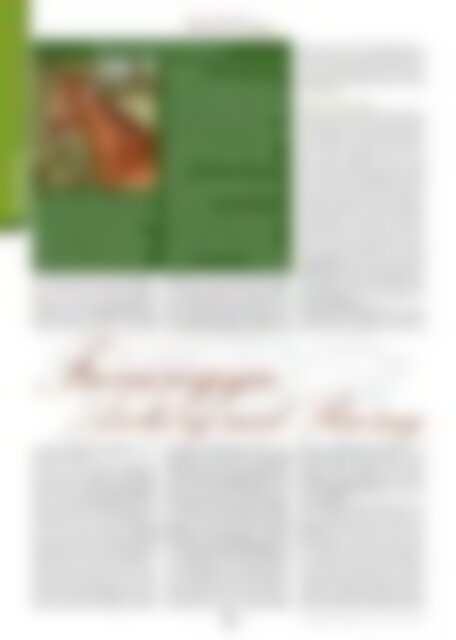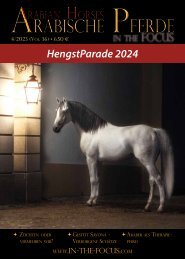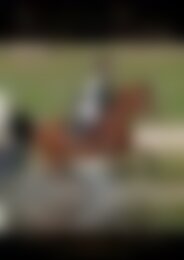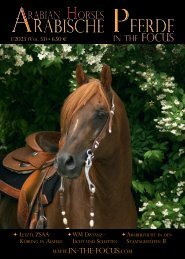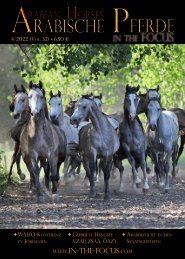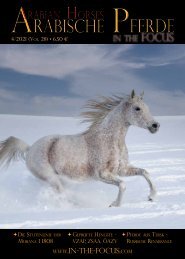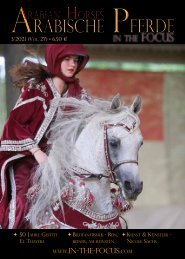Arabische Pferde IN THE FOCUS Nr. 2/2019 - Preview
Zeitschrift für Liebhaber arabischer Pferde
Zeitschrift für Liebhaber arabischer Pferde
Sie wollen auch ein ePaper? Erhöhen Sie die Reichweite Ihrer Titel.
YUMPU macht aus Druck-PDFs automatisch weboptimierte ePaper, die Google liebt.
Breeding<br />
Remembering Baghdad Al Andalous<br />
"In the spring of 2003, my most beloved<br />
mare, Dheem the Second, gave birth to a<br />
gorgeous chestnut filly, the fourth generation<br />
of our Hamdani Ofri, at my family ranch<br />
in Kafar Dael to the west of Aleppo city.<br />
She was born in the same period when the<br />
coalition forces were "destroying" Baghdad,<br />
the capital of Iraq. I was in England when<br />
my father called me to deliver the happy<br />
news of her birth. He said he has named the<br />
filly Baghdad!<br />
A few years later, Baghdad, who enjoyed a<br />
very fine and noble pedigree, became one of<br />
the most beautiful pure Syrian Arabians and<br />
was a winner in every show she participated<br />
in. Indeed, she enjoyed a happy life and made<br />
everyone around her happy and proud!<br />
In 2014, however, she was looted by ISIS and<br />
taken to Raqqa to become one of their most<br />
prestigious Arabians. A picture of Baghdad,<br />
where she was leading an "official"<br />
ISIS parade, was on Al-Hayat newspaper of<br />
London.<br />
Much to my dismay, I understand she was<br />
injured and probably killed by an airstrike<br />
on Raqqa! I also understand that she was<br />
eaten after that.<br />
I have to admit that I did not get over that,<br />
and I do not think I ever will or even want<br />
to. Particularly, I will never forgive anyone<br />
involved in her misery. I will not forgive<br />
because those "people" are proud of what<br />
they have done and do not even ask for forgiveness."<br />
Omar Anbargi<br />
easily and returned to their rightful owners. I<br />
have been to most of these stables before the<br />
war and it is heartbreaking to think that all these<br />
horses perished... But then, this war has also<br />
killed more than half a Million Syrians to which<br />
one must grieve.<br />
The Situation Today<br />
However, as tragic as these losses are, the majority<br />
of horses survived and are still breeding!<br />
And the figures given by the Arabian Horse Office<br />
and WAHO are surprising: While between<br />
1998 and 2010, the number of foals born per<br />
year increased moderately from 150 to 210,<br />
their numbers increased from 2014 to 2018<br />
from 350 to around 800 foals registered with the<br />
Syrian Arabian Horse Studbook! Even during<br />
the war, in 2016 to 2018, three registration trips<br />
to the eastern districts of Syria were made, to Al<br />
Hassakeh and Al Qamishli, where the Bedouin<br />
tribes of the Shammar, Tai, Al Jbour, Al Adwan,<br />
and Al Iqaidat live. For example, in the district of<br />
Al Hassakeh there are hundreds of horses that<br />
belong to members of the Shammar tribe, the<br />
tribe which owns the largest number of horses<br />
in this area. All in all, 2200 horses were freeze<br />
marked during these three years, and in 2018,<br />
another 1022 horses were branded and entered<br />
into the studbook. Today, a total of 8657 horses<br />
are under the supervision of the Arabian Horse<br />
Office (Studbook), of which around 80% are of<br />
pure Syrian bloodlines.<br />
2018 saw the return of Arabian horse activities<br />
and a "rehearsal" of this year's International<br />
Arabian Horse Festival, with a parade, horse<br />
Archery and Racing<br />
scus, Latakia and Hama, shows (ECAHO), auctions<br />
and endurance rides (2009 and 2010) up war. A lot of horses died because of shrapnel<br />
Homs was bombarded at the beginning of the<br />
to CEI** 120 km. Not to forget the 2007 WAHO wounds or lack of shelter since dozens of stables<br />
were demolished. To make things worse, the<br />
Conference in Syria, that took the guest on an<br />
unforgettable tour to the Al Jazira, the "island" lack of medicines made it impossible to treat<br />
between<br />
Furusiyya,<br />
Euphrates and Tigris, to experience them appropriately. Horses also died from a<br />
true Bedouin hospitality. These were the "Gol-<br />
lack of feed, as food supply was difficult to get<br />
den Years" of Arabian horse breeding in Syria,<br />
that lasted until 2010.<br />
The war hit not only the Syrian people badly<br />
but also the horses. While horse breeding in<br />
the regime-controlled areas around Damascus<br />
hasn't suffered so much, it was in the districts<br />
out of the control of the government, that most<br />
casualties occurred. A number of big studs<br />
around Aleppo were severely affected, such as<br />
Al Jabri Farm of Ihsan al-Jabri. Here, ISIS took<br />
over the farm, which included more than 100<br />
horses, mares and foals. Al Andalus stud of the<br />
Anbargi family is destroyed. "Aleppo lost almost<br />
all of its Arabians and almost all buildings were<br />
damaged", says Omar Anbargi and concluded:<br />
"I personally took a step back with almost<br />
anything to do with Arabians as it was not easy<br />
for me to get over what happened with my family<br />
horses." The Al Nassif family lost around 50<br />
horses when their farm Al Bawady in northern<br />
and expensive. Wadia Khoury of Al Furat Stables<br />
at the banks of the Euphrates river near Deir<br />
Ez Zoor has not yet returned to his home since<br />
he fled ISIS. His horses were looted by ISIS, but<br />
recently he got three offspring back after the<br />
army got hold of them. Basil Jadaan lost his<br />
horses as well, although his stable was near Damascus.<br />
"ISIS took them hostage, to blackmail<br />
me", he recalls, "but I did not pay out of principle.<br />
I haven't seen them again. Fortunately, I<br />
could regain all my bloodlines and strains from<br />
those horses that I had previously given to my<br />
sister. They represent today five generations of<br />
my breeding". Also, the horses of the National<br />
Stud near Damascus were looted, and only 22<br />
were returned, when the Syrian Arab Army freed<br />
them in 2017/2018, together with some 50 horses<br />
of private breeders. In this situation, the freeze<br />
brand, which is still in use in Syria, proved to<br />
be beneficial, as the horses could be identified<br />
exhibition, and auction, etc. In October, the first<br />
ECAHO show after the war took place with 107<br />
horses, of which 67 were of pure Syrian origin.<br />
Eight races were held in Damascus and Hama<br />
with 40 horses participating in each race meeting.<br />
Most of these races are for horses of pure<br />
Syrian bloodlines.<br />
The Festival also included a race meeting with<br />
seven races over 1450 and 1600 meters in Damascus,<br />
but unfortunately, the weather was<br />
not in favor of the horses and riders, as it rained<br />
heavily and even snowed in the nearby mountains.<br />
So the races took place in the pouring<br />
rain while the spectators huddled together in<br />
the grandstands. After three hours of freezing,<br />
a glass of whiskey that appeared from nowhere<br />
was greatly appreciated. The race meeting culminated<br />
in a spectacular display of the mounted<br />
police, doing their furussiyyah stunts while a<br />
group of horseback archers demonstrated their<br />
14<br />
© ARABISCHE PFERDE - <strong>IN</strong> <strong>THE</strong> <strong>FOCUS</strong> 2/<strong>2019</strong>


